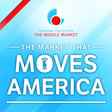Become a Creator today!Start creating today - Share your story with the world!
Start for free
00:00:00
00:00:01

Looking Back on a Decade of Leadership with Anil Makhija
Join us for this special episode with Anil K. Makhija, the dean and John W. Berry, Sr. Chair in Business at The Ohio State University Fisher College of Business and the first academic director in the National Center for the Middle Market's history.
Anil, who will return to Fisher’s faculty in June after a decade as dean, shares his unique insights into the genesis, growth and triumphs of the NCMM, the profound impact the NCMM has had at Fisher and Ohio State, and the incredible value that strategic partnerships between academia and industry can provide.
Transcript
Introduction to NCMM and Anil Makhizia's Role
00:00:01
Speaker
Welcome to The Market That Moves America, a podcast from the National Center for the Middle Market. The center is the leading source of knowledge, leadership and innovative research on the middle market economy. Throughout our podcast, we will feature middle market leaders and stakeholders to hear their real world perspectives on trends and emerging issues.
00:00:21
Speaker
The National Center for the Middle Market was founded in October, 2011 as a partnership between the Ohio State University Max M. Fisher College of Business and GE Capital. At the time of its creation, Anil Makhizia served as the first academic director of the center. In 2014, Anil was named dean of the college and appointed to the John W. Berry senior chair in business. After 10 years as dean, Anil will be stepping down in July and returning to the finance faculty.
00:00:48
Speaker
He joins us today to talk about his unique perspective in the creation, launch, and success of the NCMM. Welcome to the Market That Moves America. My name is Doug Farin, Managing Director of the National Center for the Middle Market. Today's podcast is a conversation with Anil Makhizia, who serves as Dean and John W. Berry, Sr., Chair in Business at The Ohio State University Fisher College of Business.
00:01:16
Speaker
After 10 years leading the college, he will be stepping down in July to return to the faculty. But he was also a very important part of the Center's creation and early years. So welcome,
Establishment of NCMM Post-2008 Crisis
00:01:27
Speaker
Anil. Thank you, Doug. And let's not forget that you yourself were part of that beginning. Yes, certainly. So maybe first you can tell us a little bit about your career and your time at the college.
00:01:42
Speaker
Happy to do so. It's been a very fulfilling career at Fisher, spanning almost 25 years now. It was in fact in 1998 that Mona, my wife and I arrived here as visiting profs.
00:02:01
Speaker
Well, subsequently, there's been a lot that's happened. You know, I've enjoyed the teaching and the writing, but I've also enjoyed the confidence that colleagues have had in me, giving me the opportunity to serve as chair of the finance department, academic director for the National Center for the Middle Market,
00:02:24
Speaker
associate dean for executive education, senior associate dean for the college as a whole, and now coming up close to 10 years of serving as the dean. Wow, that's quite a extensive career here. And of course, I was one of your students in the core finance class in the MBA program, which was a great memory.
00:02:49
Speaker
So let's go back to 2011. And if we could, let's talk about how NCMM was actually created originally in partnership with GE Capital. Can you
Research Focus and Economic Impact of Middle Market Firms
00:03:01
Speaker
tell us a little bit about that? Sure. The year 2011, this is the time when GE Capital is coming out of the 2008 financial crisis.
00:03:18
Speaker
and is looking to distinguish itself, differentiate itself from other providers of financial services to particularly middle market firms. And I say middle market firms in particular because that was a major part of the portfolio of business that GE Capital had that time.
00:03:46
Speaker
And so they were looking to understand this segment better, looking for an academic partner that could help in that research, etc. So we've entered into a very interesting conversation that landed up with proposing to develop a center
00:04:06
Speaker
that would collect data on this segment of the market and monitor it, do research on it, develop student talent as well for the future, and do some programming as well. And what was also very interesting about this point in time is that our dean at the time was Christine Poon.
00:04:30
Speaker
who had come from industry and brought us that corporate perspective. And that was very helpful in developing this partnership with GE Capital. What do you think GE found so attractive about partnering with Fisher? What do you think was the things about the college that stood out for them?
00:04:49
Speaker
Well, I think it was our interest in entering this segment with the research capability. And I should go on to add that
00:05:06
Speaker
Middle markets, as we go on to discover, turn out to be a very major segment of the economy. And from the Fisher point of view, it gave the college a chance to work on a segment that had been largely ignored in the past.
00:05:27
Speaker
You see, if you think about small firms, you have the small business administration devoted to it. If you think of large firms, they have deep pockets and are in the public eye. Well, right in the middle sits the middle market, and we can talk about its size and importance later, but this segment is not getting any special attention.
00:05:53
Speaker
So it gave Fisher an opportunity to put its imprint on an important component of the market that was getting ignored. And what is even more interesting is that we could not take what we learned about small firms and simply apply them to these firms. Small firms, as you know, have a very high mortality. Middle market firms live very long time. Right, right.
00:06:21
Speaker
And when you talk about large firms, large firms are largely publicly traded. Middle market firms are like 90% privately held. So this provided the white space to do something innovative that was not obviously available up to that point.
00:06:41
Speaker
Sure. Yeah.
Middle Market Summit and Policy Influence
00:06:42
Speaker
So we became the first and to this day, still the only center of our kind, which is a partnership between industry and academia, which is really interesting. You mentioned research a few times. So as our first academic director,
00:06:58
Speaker
You in particular took a highly active role. I know walking the halls and knocking on doors of Fisher faculty to encourage them to apply for the early rounds of research grants that we had at the time. Why was it so important to establish those early projects in the academic world?
00:07:17
Speaker
Yeah, so when you look at the middle market and recognize its importance, its size, about one third of the non-government GDP, about one third of employment, and you also recognize that there is a lot of white space there.
00:07:37
Speaker
work that hasn't been done, well that creates a wonderful opportunity. Now that opportunity is magnified by the realization that Fisher has very strong research-oriented faculty, so we could deliver on this. However, I should add that not only could we deliver on this, we went after the best and the brightest.
00:08:02
Speaker
not only internally, but externally as well. So to date, we have done something like 45 studies, 30 of which engage some 30 different business schools around the world.
00:08:17
Speaker
And it's not only the business schools that we went after. We went wherever the expertise was available. So, for example, we did work on exports with Brookings, on cost of capital with the Milliken Institute, on supply chains with the Supply Chain Association.
00:08:40
Speaker
And hence you can see why we were so active in research. Absolutely. You mentioned the definition of the middle market, and I get this question all the time when I deliver presentations and travel around the country. And usually there's questions around how the NCMM landed on this definition of 10 million to a billion in annual revenue.
00:09:04
Speaker
As some organizations use headcount, a lot of financial institutions will use different variations of that middle market space. But as part of the team that was here when the center was first launched, tell us about why that 10 million to a billion, the significance of that. Sure, sure.
00:09:24
Speaker
And Doug, you yourself will recall those exciting days when we debated what definition of middle market we should sponsor. So, as you know, we landed up with 10 million revenue to 1 billion.
00:09:42
Speaker
That's pretty large territory, I would admit. And indeed, when we have done work on this, we have frequently broken it up into 10 million to 50 to 100, et cetera. But really, our main argument for sponsoring this definition was
00:10:02
Speaker
that when you apply this definition, you get around 200,000 firms. And these 200,000 firms together explain, at the time at least, something like one-third of the non-government GDP and about one-third of employment. So really, in a sense, defines the middle third.
00:10:26
Speaker
And it's easy to remember too. I always use that as well. So one of the things that our partners at GE Capital did in the early days was they convened middle market leaders here at the campus of Ohio State in what they called the National Middle Market Summit. So from 2011 to 2014,
00:10:51
Speaker
Over those years, we had growing numbers of GE customers and thought leaders and people in all different types of business roles coming to campus. What are some of your memories of those summits and what was the importance in terms of bringing recognition to the center and kind of putting it on the map?
00:11:12
Speaker
Yeah, I think we were driven by a number of factors which made the summits very valuable to us. One, of course, was, as I pointed out, the middle market hadn't received the attention that it deserved. I mean, here you are with the one third of the private sector. And yet, small firms are getting attention and large firms are getting attention, but not
00:11:41
Speaker
the important middle. And also as our subsequent work has shown, this has also become, has been the driver of growth in the economy as well. So those summits were important in putting light on this ignored segment.
00:12:00
Speaker
And so those were referred to as GE Capital National Middle
NCMM's Educational Impact and Student Engagement
00:12:07
Speaker
Market Summits. And we may have started with a very modest attendance in the very first one in 2011, but very soon, by 2014, we had something like 1,200 people attend.
00:12:24
Speaker
And these were very senior managers from across the country. Many of them were CEOs. And furthermore, we were able to attract Bloomberg and CNBC to actually broadcast those. So we were able to get attention not only to the center at Fisher, but also to the segment as well.
00:12:49
Speaker
So clearly, those were our early attempts. And furthermore, it's because of that kind of attention that we were able to develop a caucus which had in it both Democrats, representatives, as well as Republicans. And so we would then travel up to the hill in DC and share with them our findings, et cetera.
00:13:18
Speaker
The result of that, of course, was policy got impacted as well. Yeah. Yeah. Those were great events. And I clearly remember some of the fireside chats between Jeff Immelt, who was the CEO of GE, and Warren Buffett, George W. Bush, just some really
00:13:37
Speaker
really interesting conversations. So in those early years, you and I in particular traveled all over the country, sometimes in partnership with GE, sometimes just doing events on our own to conferences like ACG Intergrowth and doing events at the Chamber of Commerce in Cleveland and other cities. Why do you think the middle market was such an interesting topic for so many of those audiences? You talked about white space.
00:14:05
Speaker
And I think we were able to fill some of the gap of that white space, but why do you think it was so interesting? Well, when you look at the size and importance of the market, so it remains an issue of interest as a result. When you think about how this market has continued to grow, then that draws attention. And I think it also had something to do with the message we were carrying.
00:14:33
Speaker
You see, we were undertaking a middle market indicator, a survey that engaged something like a thousand executives from this.
00:14:48
Speaker
So here we are with 90% of the market being private, so generally opaque, and then we have this insight into the market at least every six months.
00:15:04
Speaker
And so people were interested in knowing what we had to say. At the same time, they could see it was an important component of the market. And as you mentioned, this interest went across audiences.
00:15:20
Speaker
So you mentioned the ACG intergrowth. And I remember that particular one very fondly with both of us attended because we shared the stage in that particular one with Condoleezza Rice talking about her experiences regarding the middle market. You mentioned Jeff Immelt and fireside chats that occurred with, you know,
00:15:49
Speaker
Warren Buffett or with George W. Bush and Mitt Romney as well. Yes, absolutely. And I think that interest still continues today because as you mentioned, the nature of these companies is that there's very little data about them. So the fact that the center
00:16:11
Speaker
can bring a long history of data on performance, on sentiment, on how the leaders make their decisions about a number of topics has been particularly valuable. As you think about your time as dean here at the college, what impact do you think the NCMM has had on Fisher College of Business?
00:16:30
Speaker
I think the NCMM has contributed very strongly to the college. Let me give you some aspects of it. First of all, because we engage so much of our faculty in research, we have developed research capability in this segment.
00:16:52
Speaker
That itself is quite a gain. And to give you an example, and perhaps you can even add to it, Doug, very recently, you know, Wells Fargo came to us because they were interested in a study on diversity-related issues with respect to middle market. So, you know, we are known now to have that kind of capability. And then when you have that capability, you develop a message through research
00:17:21
Speaker
And we've been able to, you in particular, have been able to take it out to audiences. And though I may not remember the exact number, but I think we've delivered these messages to thousands of executives over the years.
00:17:37
Speaker
So that's another. And in the process, we have collected studies on innovation, on talent, on M&A, exports, et cetera. So we also have all that content which has helped us then develop some elective course material
00:17:58
Speaker
on middle markets. And you have been the instructor for that, and I have come in as a guest speaker at times. And more than 200 students have gone through that coursework.
00:18:13
Speaker
And these students, by the way, interestingly, have done something like 75 projects with middle market firms. And some of these are well-known names among middle markets, whether it's Noodles & Company, Garage, Cura Leaf, Ariens.
00:18:30
Speaker
So I think these are all contributions. And perhaps all of this may have been the reason why students have been interested in careers with these firms as well. So now we have a situation where students are seeking internships with these firms and they're getting jobs there as well. Yeah, absolutely.
Future of NCMM and Anil's Reflections
00:18:52
Speaker
So as you think ahead to the future,
00:18:55
Speaker
What would you like to see in terms of the NCMM and its potential for future impact, reach, engagement throughout Fisher College and even beyond? Well, first of all, I think this is a great opportunity to continue to exploit the power of partnership.
00:19:15
Speaker
We may have started with GE Capital, which subsequently, as you know, didn't stay with the middle market, but I think they were happy with us because they left us with a nice gift.
00:19:27
Speaker
But we were able to also attract other high profile firms like SunTrust, Cisco, Grand Thornton, and more recently as we are now supported by Chubb and Visa. So clearly the power of partnership is there. And I don't think we are anywhere close to seeing the fading of the importance of the middle market anyways. Thus,
00:19:57
Speaker
producing research, engaging, incorporating relationships, and developing talent. All those remain worthy causes that, of course, I know the center continues to pursue. And in relation to that, we have a new partnership with the Ohio Chamber of Commerce where we're training now Ohio middle market leaders.
00:20:22
Speaker
using a lot of the information generated out of the center as the foundation of that curriculum. So we're really excited about that. The last question I have, any favorite memories or projects or experiences that you have as you think about the last 10 years, whether it was for the middle market and CMM or just here at the college?
00:20:42
Speaker
Well, lots of happy memories. But since we are talking in the context of the middle market, I will point to the people, because that's who you remember most at the end of the day. And I think I've mentioned some of them. But whether it was working with you, Doug, or with Brenda Tsai, who was the representative of GE.
00:21:09
Speaker
capital with us, all the many guests that we had, senior management at GE Capital that took a personal interest in many of the developments that we had. As I mentioned to you, Warren Buffett, Jeffy Melt, George W. Bush, and the list goes on.
00:21:32
Speaker
And when we had something like 1,200 guests for the 2014 summit, where people walk up to me even today and share those happy memories as well. Also, I think our students have benefited from it, which is also a great source of pleasure. So for example, along with Andrea Prudholm, you've taken students to middle market firms in Italy.
00:22:01
Speaker
So it has had a very expansive impact in everything we do. That's great. Well, again, I want to first of all thank you for being our guest today, but also for your years of leadership, your partnership in helping launch the National Center for the Middle Market.
00:22:22
Speaker
And yeah, we just want to wish you the best of luck as you move on to the next part of your career and successful conclusion of your tenure as dean and moving back to the faculty. So appreciate all of your support. And again, wish you the best of luck in the future. Thank you very much. As I said, I'm already indebted. It has been a very fulfilling career thus far and more to come.
00:22:52
Speaker
Wonderful. Thanks, Anil. Thanks. Bye. Thank you for listening to The Market That Moves America. Never miss a new episode by subscribing anywhere podcasts can be found. You can also subscribe to our email newsletter at middlemarketcenter.org.








